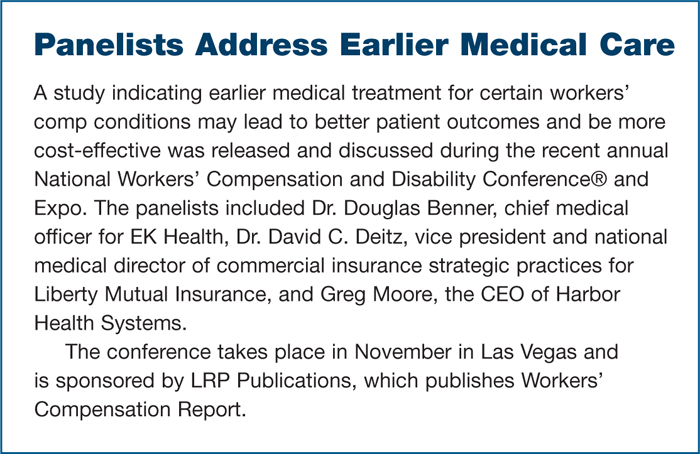Surgical Outcomes
Evidence-Based Medicine Not ‘Cookbook Medicine’

Allowing more aggressive care early can potentially bear benefits to the claim without a negative impact on the cost of the claim, according to a new study. While paying more upfront for medical care often runs contrary to most utilization review guidelines, new evidence suggests funding more care early in the claim for certain procedures leads to better outcomes for injured workers and payers alike.
During a session at the recent National Workers’ Compensation and Disability Conference® & Expo, a panel of medical specialists revealed the results of a pilot study. Despite the limitations of the research, the authors suggest certain surgical procedures performed prior to recommended guidelines may offer the best results.
Examining Intervals
Advocates for using evidence-based medicine say guidelines based on them allow for reduced variation in health care, leading to better value and improved patient care. Opponents argue guidelines promote “cookbook medicine” and are based on meta-analysis rather than clinical experience.
“Our objective is to complete an initial investigation into the differences in overall claims outcomes when comparing aggressive and conservative care in workers’ compensation,” explained the authors in the pilot study. “The purpose of this study is to investigate whether allowing some common specific surgical procedures to be performed prior to the guideline recommendation would impact the outcome of the case.”
The study, Impact of Aggressive Care in Workers’ Compensation, was produced by Harbor Health Systems, a software and service provider for workers’ comp managed care programs. It examined 700,000 closed claims with injury dates between Jan. 1, 2010 and June 20, 2012, with four retrospective studies using the following common surgical procedures in workers’ comp:
- Arthroscopic anterior cruciate ligament repair — surgical ACL reconstruction has become “the standard of care for this injury,” according to the study.
- Arthroscopic menisectomy of the knee.
- Rotator cuff repair of the shoulder.
- Endoscopic or open carpal tunnel release.
The treatment timeline for each procedure group was defined as the time interval between the date of injury (DOI) and the first date of service (DOS) of the procedure. Official disability guidelines from the Work Loss Data Institute were used as a reference point to separate the claims into either aggressive care — where the DOS was prior to guideline recommendations — and conservative care — where the DOS was beyond the guideline recommendation. Three weeks were added to the ODG guidelines to allow for the time associated with the logistics of accessing care post-DOI and scheduling the surgery.
Outcome measurements included the claim cost — allowed medical and other costs, total disability days, and claim duration. Any provider contract discounts were neutralized by using the allowed medical fee schedule.
Impact on Claim Duration
To determine the potential impact of aggressive care for each grouping, the researchers looked at overall claims outcomes, including costs of claims, duration, and disability; claim attributes such as litigation and recidivism; and utilization such as the use of medical, use of diagnostics, and use of physical therapy.
 “In all of the procedures studied, there is a statistically significant shorter time in the study group, aggressive care, versus the control group, conservative care, with regard to the interval between the DOI and DOS,” the study said. The authors said the research should be considered a pilot study to steer future research since there was no visibility into patient-doctor visits or utilization review processes on different claims, among other limitations.
“In all of the procedures studied, there is a statistically significant shorter time in the study group, aggressive care, versus the control group, conservative care, with regard to the interval between the DOI and DOS,” the study said. The authors said the research should be considered a pilot study to steer future research since there was no visibility into patient-doctor visits or utilization review processes on different claims, among other limitations.
Nevertheless, “all study groups showed a remarkably shorter difference in claim duration compared to the control groups,” the report said. “This was most dramatic in the carpal tunnel release group and the menisectomy group.”
Among the specific results were:
- A lower evaluation and management amount in the study groups for the menisectomy, rotator cuff, and carpal tunnel repair.
- Markedly lower incurred expense in the study group in the ACL reconstruction, menisectomy, and rotator cuff repair compared to the control group.
- Lower allowed total medical in the study group for rotator cuff repair and ACL reconstruction; however there was minimal difference in total allowed medical in the carpal tunnel and knee menisectomy groups.
- Lower total temporary disability days in the study group for ACL reconstruction, rotator cuff repair, and carpal tunnel release. Additionally, the incurred indemnity difference was most dramatic in these groups.
“There was a remarkably lower litigation rate in the study group compared to the control group” of all four sets studied, the report says. “Perhaps a perceived delay of care led to the higher litigation rate in the control group, or by virtue of the litigation and perhaps change of treating physicians, the surgery was delayed in the control group.”
Overall, the results indicated a universal decrease in claim duration, TTD days, incurred medical, and total allowed medical, the study says. Also, there was no indication that aggressive care had adverse unintended consequences.










